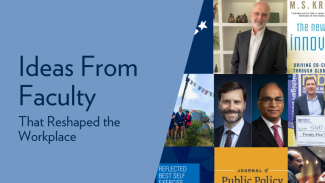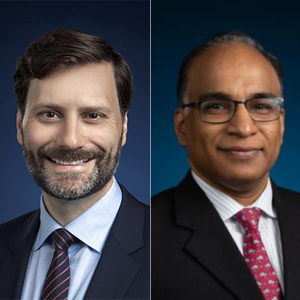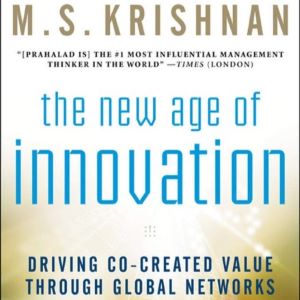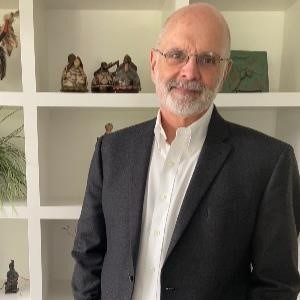Ideas From Michigan Ross Faculty That Reshaped the Workplace

Since 1924, research and big ideas from Ross School of Business faculty have changed the landscape of the business world.
Michigan Ross faculty have long been at the forefront of transforming how we approach work and leadership. Their contributions have redefined professional practices, from the development of N=1;R=G business models that challenge traditional business frameworks to the creation of the field of managerial and organizational cognition, which has reshaped how we understand decision-making and organizational behavior. Innovative faculty-constructed tools like the Reflected Best Self Exercise™ have also helped individuals unlock their full potential, changing the way we view personal growth in the workplace.
Throughout our centennial year, we’ve celebrated these groundbreaking contributions and their lasting influence. The work of Michigan Ross faculty, both past and present, has not only reshaped the business world but also altered the very nature of how we work, lead, and engage with one another in professional environments. We invite you to explore a few of these transformative ideas that continue to inspire and challenge the status quo.
see our full list of ideas with impact
Big Ideas That Revolutionized The Way We Work
Here are a few of our faculty’s powerful ideas, which have significantly impacted the workplace and the ways we exist within it.
 How Non-Competes Harm Workers
How Non-Competes Harm Workers
2006
Professors Norman Bishara and Jagadeesh Sivadasan have made significant contributions to influential literature examining the variation in the enforceability of non-compete clauses and their consequences. Their work is an important part of broader literature documenting monopsony power (i.e., the power of employees to set wages leading to a redistribution of surpluses away from workers), worker mobility, and knowledge transfers. In a pioneering paper published in 2010, Bishara created a detailed rating of the non-compete enforceability in all 50 states, building on painstaking work parsing the regulations and case law at the state level.
The enforceability index from Bishara's 2010 paper, combined with worker-quarter-level U.S. Census data, was used in a paper by Sivadasan and co-authors to show that higher enforceability is correlated with lower wages and mobility for tech workers.
read more
 Anticipating the Brave New World of N=1;R=G Business Models and Ecosystem Innovation
Anticipating the Brave New World of N=1;R=G Business Models and Ecosystem Innovation
2008
From 2000 to 2005, Professors C.K. Prahalad and M.S. Krishnan co-authored several papers on concepts related to how the emergence of digital technologies was transforming business models. From 2005 to 2008, they co-authored the book New Age of Innovation, which introduced the concept of N=1;R=G business model framework. The basic argument was that given the new capabilities emerging from digital technologies, the structure of business models was in the midst of a transformation across industries.
They claimed that business models will shift from mass production of products or services to businesses co-creating personalized experiences for one customer at a time. They called this N=1 business model, i.e., businesses will operate on a sample size (N) of one.
read more
 Reflected Best Self Exercise™
Reflected Best Self Exercise™
2005
Originally developed by Professors Gretchen Spreitzer, Bob Quinn, Jane Dutton, and Laura Morgan Roberts through their research at the Center for Positive Organizations, the Reflected Best Self Exercise™ is a personal development tool that helps you to see who you are at your best, engaging you to live and work from this powerful place daily. Since its launch, the RBSE has helped thousands of executives, managers, employees, and students discover new potential.
Unlike most other feedback tools, the RBSE isn't limited to self-assessment. It invites people from your life and works to share stories of moments they feel they've seen you at your best, surfacing what few of us become aware of otherwise.
read more
 Creating the Field of Managerial and Organizational Cognition
Creating the Field of Managerial and Organizational Cognition
1988
Professor Jim Walsh played a significant role in the development of work on individual, group, and collective cognition in organizations. Interested in managerial mistakes, Walsh wanted to know if executives’ worldviews could blind them to their decision environments. He was also interested in learning how the cognitive capabilities of both leadership teams and the organization itself could be harnessed for the good of organizations.
When interest in cognition in organizations started to grow, Walsh became a founding officer of the Academy of Management’s Managerial and Organizational Cognition Interest Group in 1990 and helped to lead that pioneering group of scholars for the first three years of its existence. Tying all of his insights and experiences together, he wrote what became something of a field-defining scholarly paper in 1995. Titled “Managerial Organizational Cognition: Notes from a Trip Down Memory Lane,” it was published in Organization Science.







